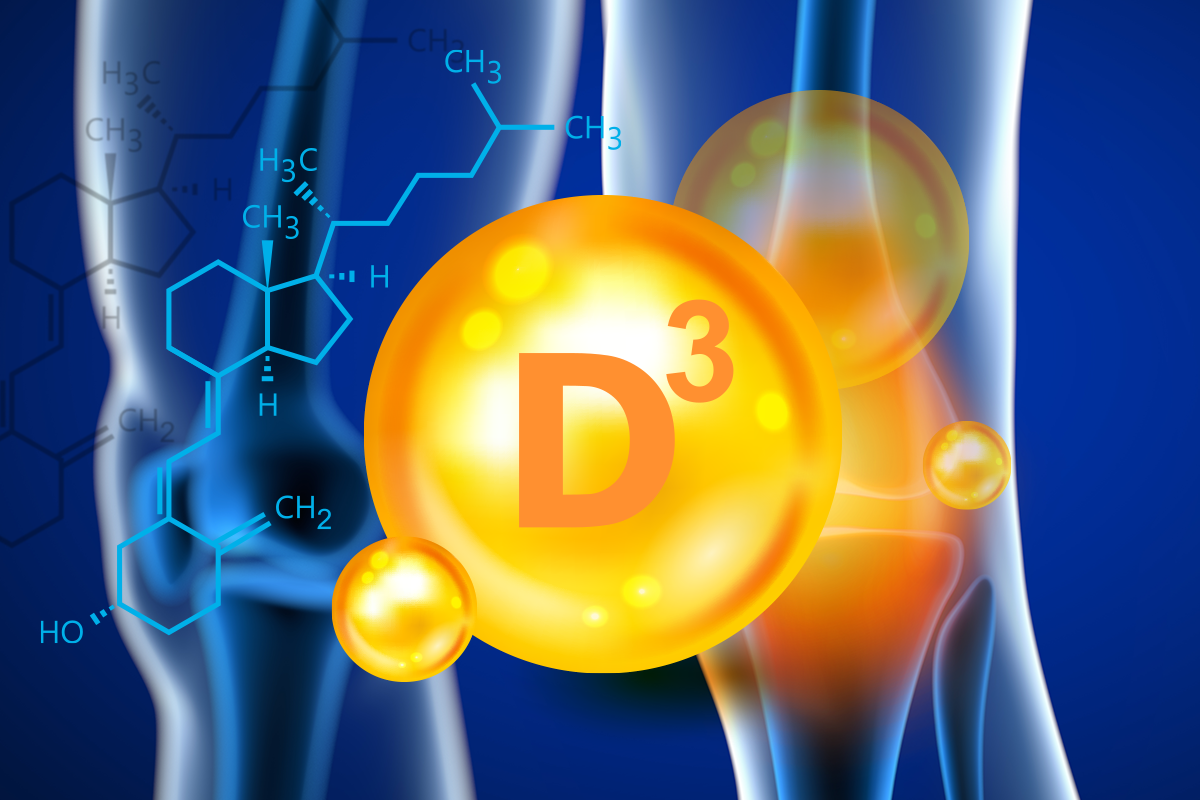Vitamin D belongs to the group of liposoluble vitamins with proven biological effects. It is synthesized in the skin under the action of ultraviolet rays, and two forms are present in the diet: vitamin D2 (ergocalciferol), which originates from plants, and vitamin D3 (cholecalciferol), which is formed from cholesterol in animal and plant tissues.
The two forms of vitamin D differ from each other in chemical structure and biological activity. Namely, the results of the study showed that, due to the existing structural and metabolic differences, vitamin D3 shows a 3-4 times stronger effect compared to vitamin D2. The main role of vitamin D in the human body is to maintain the homeostasis of calcium and phosphorus and the proper functioning of the bone and joint system. In addition, a number of beneficial extracorporeal effects have been shown. Although it is called a “vitamin”, this substance shows all the characteristics of hormones. The recommended daily amounts for vitamin D3 are 400-800 international units (IU), while for special needs of the body, sensitive people who are less exposed to the sun and severe hipovitaminosis, 1000-2000 IU is recommended. It is necessary to adhere to the recommended daily doses, because an excessive amount can cause hipervitaminosis and side effects, such as hypercalcemia, nausea, vomiting, damage to the kidneys and other organs. Optimal sources of vitamins are food products, i.e. food that contain vitamin D, skin exposure to sunlight and supplementation with this vitamin.
Vitamin D primarily regulates the homeostasis of calcium and phosphorus through specific receptors, and thus contributes to bone health. The two most important mechanisms by which vitamin D maintains normal calcium and phosphate concentrations are to facilitate the resorption and uptake of calcium and phosphate from the intestine, and to accelerate their mobilization from bone. It also acts on the kidneys, causing retention, i.e. retention of calcium and phosphate in the body. In the case of vitamin D deficiency, the resorption of calcium and phosphate from the digestive tract is significantly reduced, which triggers mechanisms that can lead to demineralization and bone damage. In addition to bones, intestines, and kidneys, vitamin D receptors have been detected in a number of other tissues in which vitamin D exhibits significant biological effects, such as regulation of hormone synthesis, insulin secretion, and production of cytokines important for immune system functioning (1). Therefore, vitamin D, except for the health of the bone and joint system, is increasingly recommended for people with autoimmune, malignant, cardiovascular and other chronic diseases.
The mechanism of action of vitamin D in autoimmune diseases has been shown in preclinical studies by its effect on the production of inflammatory mediators and the reduction of excessive inflammation (2). Clinical studies have shown the importance of vitamin D in several autoimmune diseases, such as multiple sclerosis (3), rheumatoid arthritis (4) and Crohn’s disease (5). The beneficial effects of vitamin D in the prevention of diabetes mellitus are based on the expression of vitamin D receptors on pancreatic cells with a beneficial effect on insulin secretion (6). Literature data indicate a correlation and possible beneficial effect of vitamin D in malignant diseases (7). The presence of vitamin D receptors on the endothelium, vascular smooth muscle and cardiomyocytes enables the protective action of vitamin D in atherosclerosis and cardiovascular diseases, and further clinical trials are also necessary (8). Epidemiological studies have shown an association between hipovitaminosis D and impaired cognitive function. Namely, the latest meta-analysis indicated an increased incidence of dementia and Alzheimer’s disease in individuals with low serum concentrations of vitamin D metabolites (9). Recent studies have shown that vitamin D affects the preservation of immunity and increases the number of T lymphocytes, which are especially important in the fight against viral infections (10). Clinical experience so far confirms the beneficial effects of vitamin D, which is why this vitamin, since the beginning of the epidemic of a new form of coronavirus, has been recommended in patients with Covid-19.
Taking into account all the biological effects of vitamin D in maintaining the proper function of the whole organism, vitamin D3 is recommended for all people with symptoms and signs of hipovitaminosis D. It is especially recommended for people with diseases of the musculoskeletal system, patients with autoimmune, malignant and cardiovascular diseases. Previous data and clinical experience indicate the importance of its use in patients with Covid 19.

Janko Samardžić MD, PhD
Clinical Pharmacologist
References:
1. Hanel et al. Vitamin D and evolution: pharmacologic implications. Biochem Pharmacol 2020;173:113595.
2. Christakos et al. Vitamin D: metabolism, molecular mechanism of action, and pleiotropic effects. Physiol Rev 2016; 96(1): 365–408.
3. Atkinson et al. Canadian recommendations for vitamin D intake for persons affected by multiple sclerosis. J Steroid Biochem Mol Biol 2020;199:105606.
4. Lee et al. Vitamin D level in rheumatoid arthritis and its correlation with the disease activity: a meta-analysis. Clin Exp Rheumatol 2016;34(5):827-833.
5. Ham et al. Vitamin D levels in adults with Crohn’s disease are responsive to disease activity and treatment. Inflamm Bowel Dis 2014;20(5):856-60.
6. Yu et al. Association between vitamin D and prediabetes: A PRISMA compliant meta-analysis. Medicine (Baltimore) 2020;99(8):e19034.
7. Wu et al. Repurposing vitamin D for treatment of human malignancies via targeting tumor microenvironment. Acta Pharm Sin B 2019;9(2):203-219.
8. Rai et al. Role of vitamin D in cardiovascular diseases. Endocrinol Metab Clin North Am 2017; 46(4): 1039–1059.
9. Chai et al. Vitamin D deficiency as a risk factor for dementia and Alzheimer’s disease: an updated meta-analysis. BMC Neurol 2019;19(1):284.
10. Grant et al. Evidence that vitamin D supplementation could reduce risk of influenza and COVID-19 infections and deaths. Nutrients 2020;12(4):988.
Product recommendations

